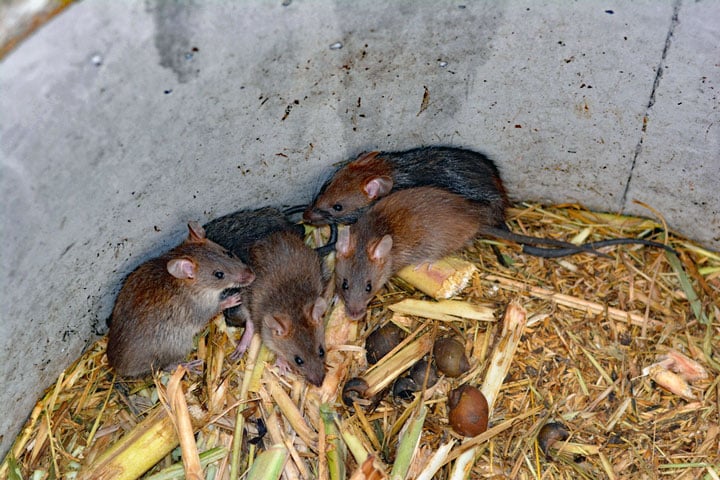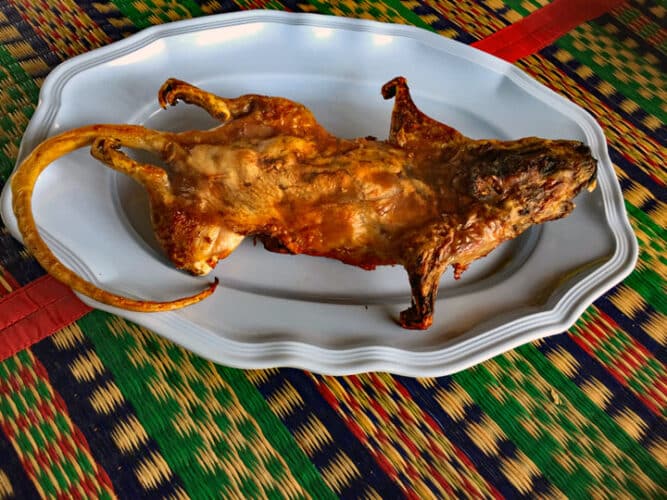
Welcome to Thailandblog.nl
With 275.000 visits per month, Thailandblog is the largest Thailand community in the Netherlands and Belgium.
Sign up for our free e-mail newsletter and stay informed!
Newsletter
Language setting
Rate Thai Baht
Sponsor
Latest comments
- RonnyLatYa: Yes, I say that Kanchanaburi is just an example and that you can change that. You can also do this on the web page itself and then see
- william-korat: In the dry period the line is bottom of Bangkok and lower and east of that to just above Khao Yai National Park usually we
- Eric Kuypers: If you change the command line, such as https://www.iqair.com/thailand/nong-khai, you will get a different city or region. But you
- Cornelis: Well, GeertP, I am absolutely not a 'Brussels sprouts supporter' or THE Red Brand addict, but that does not mean that I don't like the Thai cuisine.
- Rudolf: It depends on what you are looking for in Thailand, but to be honest you don't have much choice in my opinion. The big cities are falling apart
- RonnyLatYa: Also take a look at this. https://www.iqair.com/thailand/kanchanaburi Also scroll down a bit and they will also give you some explanation
- Peter (editor): I also enjoy the Thai food and yes, the price is very attractive. But it's just a fact that Thai farmers are unbelievable
- Jacks: It is best to go in the period November to February. Someone with asthma should absolutely not come here from March to May
- GeertP: Dear Ronald, I completely agree with your story, I also enjoy Thai cuisine every day and even after 45 years of Thai
- Eric Kuypers: Wilma, bad air is not in all of Thailand. Thailand is more than 12x the Netherlands! These are the big cities (traffic) and some
- Pjotter: kopi luwak regularly bought and drunk in the Netherlands. Usually only available some time before Christmas. You get the best coffee taste
- Jack S: Oh dear…. Except for the fact that I also start the day with a coffee, everything is different for me... my coffee is just a
- hans: Tastes differ, but this just looks beautiful.
- Lenaerts: Dear, I went to immigration yesterday to apply for a retirement visa, very friendly people and they helped quickly
- Aad: I buy my coffee at Lotus. Add a teaspoon of that coffee to warm water and enjoy
Sponsor
Bangkok again
Menu
DOSSIERS
Learning objectives and topics
- Background
- Activities
- Advertorial
- Agenda
- Tax question
- Belgium question
- Sights
- Bizarre
- Buddhism
- Book reviews
- Column
- Corona crisis
- The Culture
- Diary
- Dating
- The week of
- Dossier
- To dive
- Economy
- A day in the life of…..
- Islands
- Food and drink
- Events and festivals
- Balloon Festival
- Bo Sang Umbrella Festival
- Buffalo races
- Chiang Mai Flower Festival
- Chinese New Year
- Full Moon Party
- Christmas
- Lotus Festival – Rub Bua
- Loy Krathong
- Naga Fireball Festival
- New Years Eve celebration
- Phi ta khon
- Phuket Vegetarian Festival
- Rocket festival – Bun Bang Fai
- Songkran – Thai New Year
- Fireworks Festival Pattaya
- Expats and retirees
- state pension
- Car insurance
- Banking
- Tax in the Netherlands
- Thailand tax
- Belgian Embassy
- Belgian tax authorities
- Proof of life
- DigiD
- emigrate
- To rent a house
- Buy a house
- In memoriam
- Income statement
- King's day
- Cost of living
- Dutch embassy
- Dutch government
- Dutch Association
- News
- Passing away
- Passport
- Retirement
- Drivers license
- Distributions
- Elections
- Insurance in general
- Visa
- work
- Hospital
- Health insurance
- Flora and fauna
- Photo of the week
- Gadgets
- Money and finance
- History
- Health
- Charities
- Hotels
- Looking at houses
- Isaan
- Khan Peter
- Koh Mook
- King Bhumibol
- Living in Thailand
- Reader Submission
- Reader call
- Reader tips
- Reader question
- Society
- marketplace
- Medical tourism
- Environment
- Nightlife
- News from the Netherlands and Belgium
- News from Thailand
- Entrepreneurs and companies
- Education
- Research
- Discover Thailand
- Opinions
- Remarkable
- Calls
- Floods 2011
- Floods 2012
- Floods 2013
- Floods 2014
- Winter prices
- Politics
- Poll
- Travel stories
- Travel
- Organizations
- Shopping
- Social media
- Spa & wellness
- Sport
- Cities
- Position of the week
- The beach
- Language
- For sale
- TEV procedure
- Thailand in general
- Thailand with children
- thai tips
- Thai massage
- Tourism
- Going out
- Currency – Thai Baht
- From the editors
- Real estate law; and
- Traffic and transport
- Visa Short Stay
- Long stay visa
- Visa question
- Flight tickets
- Question of the week
- Weather and climate
Sponsor
Disclaimer translations
Thailandblog uses machine translations in multiple languages. Use of translated information is at your own risk. We are not responsible for errors in translations.
Read our full here disclaimer.
Royalty
© Copyright Thailandblog 2024. All rights reserved. Unless stated otherwise, all rights to information (text, image, sound, video, etc.) that you find on this site rest with Thailandblog.nl and its authors (bloggers).
Whole or partial takeover, placement on other sites, reproduction in any other way and/or commercial use of this information is not permitted, unless express written permission has been granted by Thailandblog.
Linking and referring to the pages on this website is permitted.
Home » News from Thailand » Unemployed Thai succeeds in breeding rats for consumption
Unemployed Thai succeeds in breeding rats for consumption
Somkiart, 34, from Huanakham Pattana village in Nakhon Ratchasima lost his job as a factory worker three months ago, but saw his chance. He decided to breed the noo na or noo phook (bandicoot rats), which is popular in Thailand.
His own family loves it, but he now also earns more than 10.000 baht a month selling the rat meat.
This rat species was common in the rice fields in the past and the rural inhabitants of Isan often hunted it. The rats are becoming scarcer due to the use of pesticides. The rodents are larger than normal rats and weigh 500 grams or more. In the Isaan they find the meat of the rat a delicacy for the grill.
Somkiat bought some rats and saw that they reproduced quickly. Now his farm has more than four hundred bandicota rats. They are sold for 200 to 500 baht per kilo.
Source: Bangkok Post



I think this is a great story and unfortunately many farmers do not realize the position they have as a food producer.
Where there is plenty of water, growing rice for export and where harvesting is only possible once a year is for personal use. The latter must be fed to goats, quails, rabbits, guinea pigs, etc. for export to China.
Perhaps not a nice message for animal lovers, but growing rice and vegetables will not get them any better.
Dear Johnny BG
my wife has an organic farm in Sisaket and uses 2 rai to grow vegetables on it she has an average monthly income of 40000bth all costs deducted from which salary of 1 helper.
She has to work hard, that is obvious as a farmer, but that is not obvious for all farmers here.
I know farmers here who started with goats, quails and rabbits here, most of them have stopped because there is no decrease.
There is a great demand in Thailand for organic fruit and vegetables, both for the domestic market and for export to Europe, the US and other countries.
The farmers who want to switch to organic are often persuaded by chemical dealers and provided with their products for free.
Dear Hugo,
I know the problems and it is different for every farmer. But let me put it another way…
It would not do any harm to have supply and demand matched on a more equal basis, as an auction or cooperative, for example, works. The organization goes to the farmer as a representative of the affiliated farmers and is therefore much better able to assess what the needs of buyers are and, where necessary, to steer in terms of supply.
CP is the biggest disruptor in the Thai food chain and hence the niches that have an opportunity.
Organic may be one of them, but to be honest I think it's mafia practices imposed by the big supermarkets in collaboration with their chemical friends and I'm glad there is a trend from the US not to follow that.
If a farmer does not have to spray, that saves money, but then there are the larger powers that determine that fruit and vegetables must meet beauty requirements… whispered by the seed and pesticide mafia. A few expensive agencies will then determine whether you qualify (read , can you afford the costs) to grow organically and if so, you can use a label that allows the consumer to pay the main price for maintaining this nonsense. And to maintain this, certain pesticides may be used…..
As a government, ensure that the real poison is not allowed to be produced (EU makes serious mistakes here, Bayer, Germany, trade interests) and check for residues before it is exported and actually punish. And the consumer should learn not only to look at beauty. The eye wants something, but when it's used you don't look at it anymore.
Not strange, they are just skinned on the market those rats, and what to say about the Muskrat !! (water rabbit) which is simply on the menu at our Belgian friends in Belgium!!!
Selling muskrat meat is still prohibited in the Netherlands. The Flora and Fauna Act states that hunted animals may not be eaten.